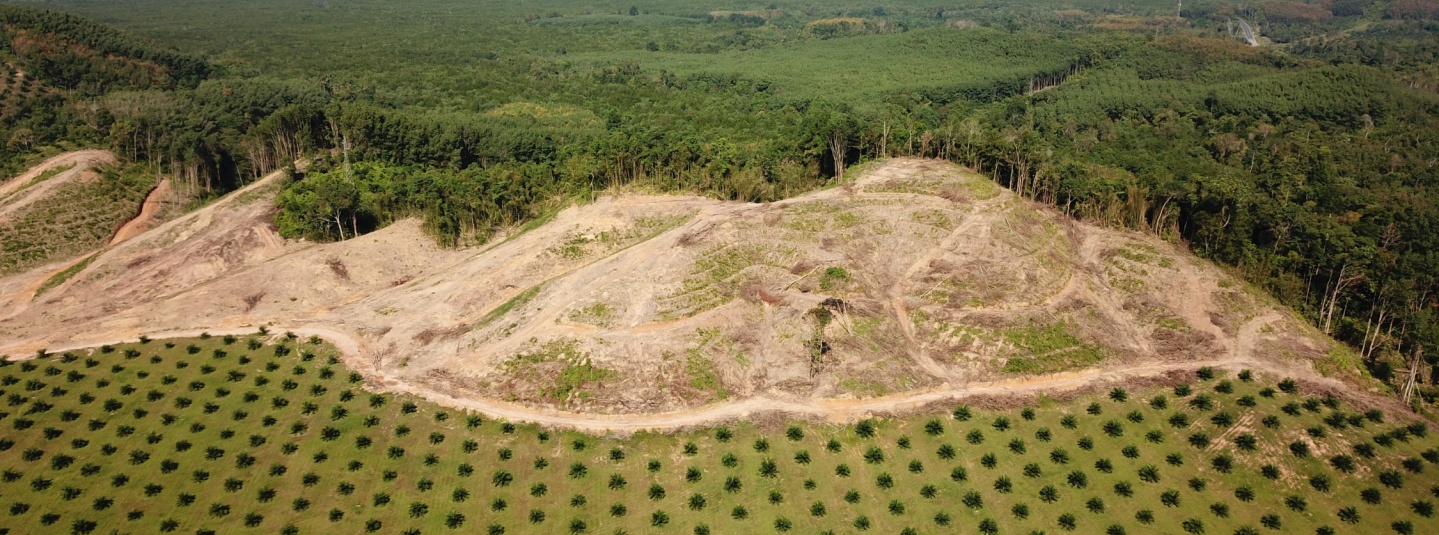
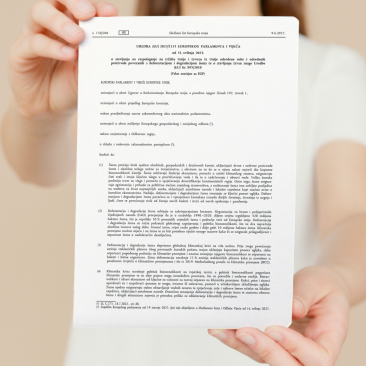
Quick EUDR facts
Get an basic understanding of the new Regulation on Deforestation-free Products.
-
Why is there a need for EUDR?
The EU is a major consumer of commodities associated with both deforestation and forest degradation, which are major drivers of climate change (11% of greenhouse gas emissions) and biodiversity loss.
With this historic agreement, the EU wants to reduce its contribution to deforestation and thus guarantee to its citizens that the products they buy don’t impact the world’s forests.
-
What are the objectives of EUDR?
The overarching EUDR objective is to minimise the EU’s contribution to global deforestation and forest degradation. This is achieved by minimising the risk of products from supply chains associated with deforestation or forest degradation being placed on the EU market or exported from it and stimulating the demand for and trade in legal and «deforestation-free» commodities and products within the EU.
-
What does "deforestation-free" mean?
Under EUDR, deforestation-free means:
- that the timber products are sourced from timber produced on lands that have not been subject to deforestation after 31 December 2020, and
- specifically for timber products, that the timber was harvested from the forest without inducing forest degradation after 31 December 2020.
-
Which are the important dates around EUDR?
-
What is FSC Aligned for EUDR?
FSC helps companies comply with the EUDR Regulation. Apart from a few system-wide changes, new FSC offering under the name "FSC Aligned for EUDR" is voluntary and it includes 3 main components:
- FSC Regulatory Module
- FSC Risk Assessment Framework
- FSC Trace
FSC Aligned for EUDR
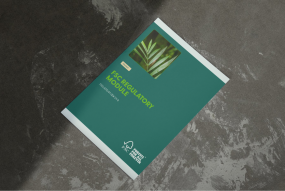
FSC Regulatory Module
This new voluntary add-on module supports EUDR compliance by providing additional requirements.
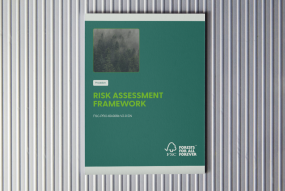
FSC Risk Assessment Framework
The framework provides a comprehensive tool for companies to assess and mitigate risks of sourcing forest materials.
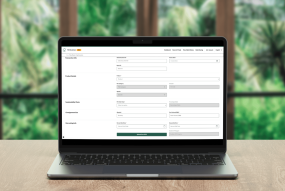
FSC Trace
FSC Trace is a pivotal platform in fulfilling FSC's commitment to assisting licence holders in due diligence.
EUDR vs. EUTR
EUDR, with its major scope of minimisation of the EU’s contribution to global deforestation and forest degradation, is larger and more complex Regulation, as compared to the EUTR, which aims to prevent sales of illegal timber and timber products in the EU market.
The new Regulation on Deforestation-free Products (EUDR) becomes applicable at the end of 2024 (mid 2025 for micro and small companies), but it does not fully repeal the EUTR until the end of 2027. EUDR requires that timber and timber by-products (as listed in the EUTR) harvested before the entry into force date and sold after the date of application are considered to be compliant with the EUTR regulation for 3 years (end of 2027).
Some of the important differences between the two Regulations are shown below:
-
Scope of applicationRelevant commodities
EUDR: Timber and cattle, cocoa, coffee, oil palm, rubber, soya
EUTR: Timber
Relevant Timber productsEUDR: EUTR listed + charcoal, tools, timber wool, books and newspapers, kitchen furniture, coffins, seats etc
Note: The list of all relevant products can be found in Annex I of the EUDR Regulation.
EUTR: Products containing paper, paper- board, timber fibre or timber
Types of timber products coveredEUDR: Timber and other products imported into the EU, produced and consumed in the EU and exported from the EU.
EUTR: Timber and other timber by-products circulating within the EU market, whether domestically produced or imported.
-
Target playersOperators
EUDR: Any natural or legal person who, in the course of a commercial activity, places timber and timber by-products on the EU market or exports them from the EU market.
EUTR: Companies (importers and loggers) that place timber and timber by-products on the EU market.
TradersEUDR: Any entity in the supply chain other than the operator who, in the course of a commercial activity, makes timber and timber by-products available in the EU market.
EUTR: Companies that buy or sell timber or timber by-products on the internal EU market after it has first been placed on the market.
-
RequirementsProhibition
EUDR: The making available or sale of timber or timber by-products in the EU market:
- that have contributed to deforestation and forest degradation
- that were illegally harvested
- that are not covered by a due diligence statement are forbidden.EUTR: The placing on the market of illegally harvested timber or timber by-products is prohibited.
Obligation of operatorsEUDR: Operators must carry out due diligence prior to placing timber or timber by-products on the EU market or exporting them out of the EU, using both a system and procedures, and must first submit a due diligence statement. Operators must provide their Due Diligence information to other operators and traders further down the supply chain. Each year, they must publish a report on their Due Diligence.
EUTR: Operators must demonstrate due diligence when placing timber or timber by-products on the EU market, using both a system and procedures. They must maintain and regularly evaluate their due diligence system.
Exemption for SME operatorsEUDR: SMEs are exempt from:
- Due Diligence if the products have already been subject to Due Diligence,
- the publication of a report on their Due Diligence.EUTR: not applicable
Note: SME - small and medium-sized enterprises
Obligation of tradersEUDR: Large traders (non-SMEs) are subject to the same due diligence requirements as large operators (no more «shell» companies). All traders must gather and keep some information from their suppliers and customers for 5 years and cooperate with the competent authorities.
EUTR: Keep records of timber purchases and sales for five years and make them available to competent authorities upon request.
Traceability requirementsEUDR: As part of the Due Diligence process, operators must gather geolocation information on all of the plots of land where the timber of the relevant products was harvested and the date/period of production. The «geolocation» means the GPS coordinates of the production plots of land, or the plot of land’s perimeter (using polygon).
EUTR: Traders must gather and keep information from suppliers throughout the supply chain and from their clients. As part of due diligence, operators must assess the complexity of the supply chain for timber.
-
Due dilligenceGathering of information
EUDR: The information is the same as for the EUTR (sometimes in greater detail) and includes:
- evidence that there is no deforestation or forest degradation,
- the geolocation of production plots of land and the dates/periods of production.EUTR: The information to be gathered regarding the products are:
- the description,
- the country/region/ concession of harvest,
- the quantity,
- the names and contact details of both the supplier and client,
- compliance and legality information.Risk AssessmentEUDR: The risk assessment takes into account the EUTR’s criteria, as well as the following:
- the EC’s assignment of risk to the relevant country of production (see Country assessment – Art 29),
- the presence of forests in the country / production area,
- the prevalence of deforestation or forest degradation,
- the presence of indigenous peoples,
- consultation and cooperation in good faith with indigenous peoples,
- the existence of justified claims by indigenous peoples to land and usage rights,
- concerns regarding corruption or the falsification of documents/data,
- the risk of mixing products,
- the conclusions of EC expert panels,
- Reports of justified concerns (Art 31),
- etc.EUTR: The risk assessment procedures are based on:
- The gathered information,
- assurance of compliance with legislation, such as third-party certification,
- the prevalence of illegal harvesting or illegal practices,
- sanctions (UN, EU Council),
- the complexity of the supply chain.Risk mitigationEUDR: In the event of a non-negligible risk, risk mitigation procedures may include:
- the requiring of additional information or documentation,
- the conducting of independent inspections or audits,
- other measures depending on the information that is gathered,
- the enhancement of capacities and investments.
Checks, measures and procedures must be in place prior the products are placed on the market.
Additional requirements apply to non-SMEs:
- the appointment of a compliance officer at the management level,
- the conducting of independent audits to check the internal system.
Decisions on risk mitigation measures are documented, evaluated at least once a year and made available to competent authorities upon request.EUTR: In the event of a non-negligible risk, risk mitigation procedures may include:
- the requiring of additional information or documentation,
- and/or the requiring of third-party verification.
- and/or other measures according to the information collected.Simplified due dilligenceEUDR: For products coming from countries assessed by the EC as low risk (see Country assessment – Art 29), it is possible to carry out simplified due diligence:
- Gathering of information (step 1),
- Exemption from risk analysis and mitigation measures (steps 2 and 3), after having analysed the risk of mixing with products having an unknown origin.EUTR: not applicable
Assessment of countries by the ECEUDR: The EC will conduct risk assessments by country (EU and other countries):
- The EC will publish a list of low and high risk countries,
- The results will be available via the EC’s «Information System»,
- The system has 3 country assessment levels: low, standard or high risk.EUTR: not applicable
-
Information system and Customs proceduresInformation system
EUDR: The European Commission establishes and maintains an information system («register») enabling operators to submit their due diligence statement and to verify the statement that have already been recorded. This register will be interconnected with customs authorities and will be accessible to competent authorities so that they may conduct their checks.
EUTR: not applicable
Customs proceduresEUDR: An agreement between competent authorities and customs authorities will be established. Customs authorities will have to verify the status of the Due Diligence statement prior to authorising a «release for free circulation» or export.
EUTR: not applicable
